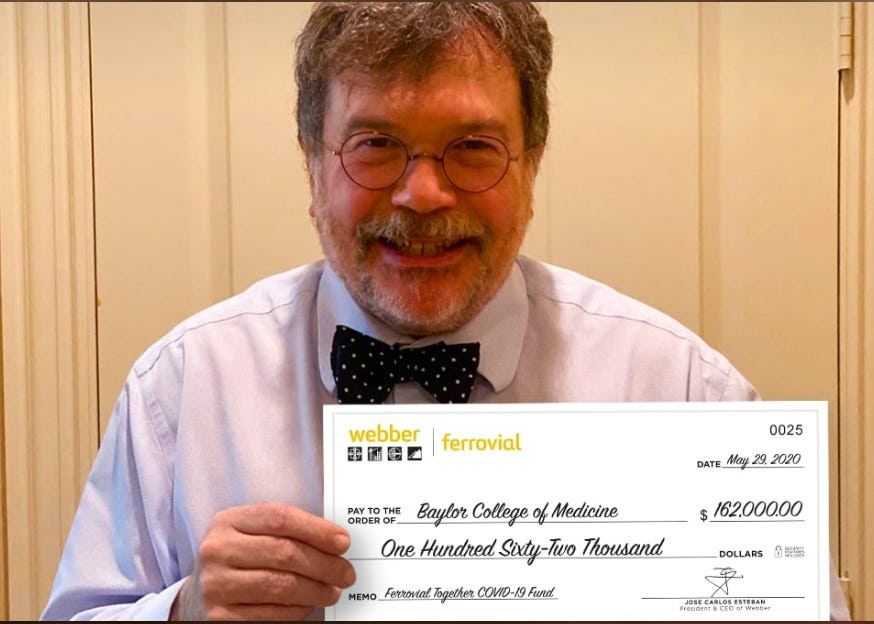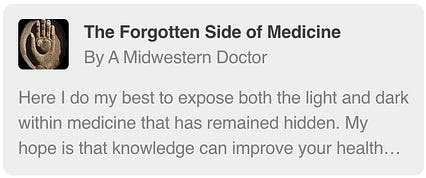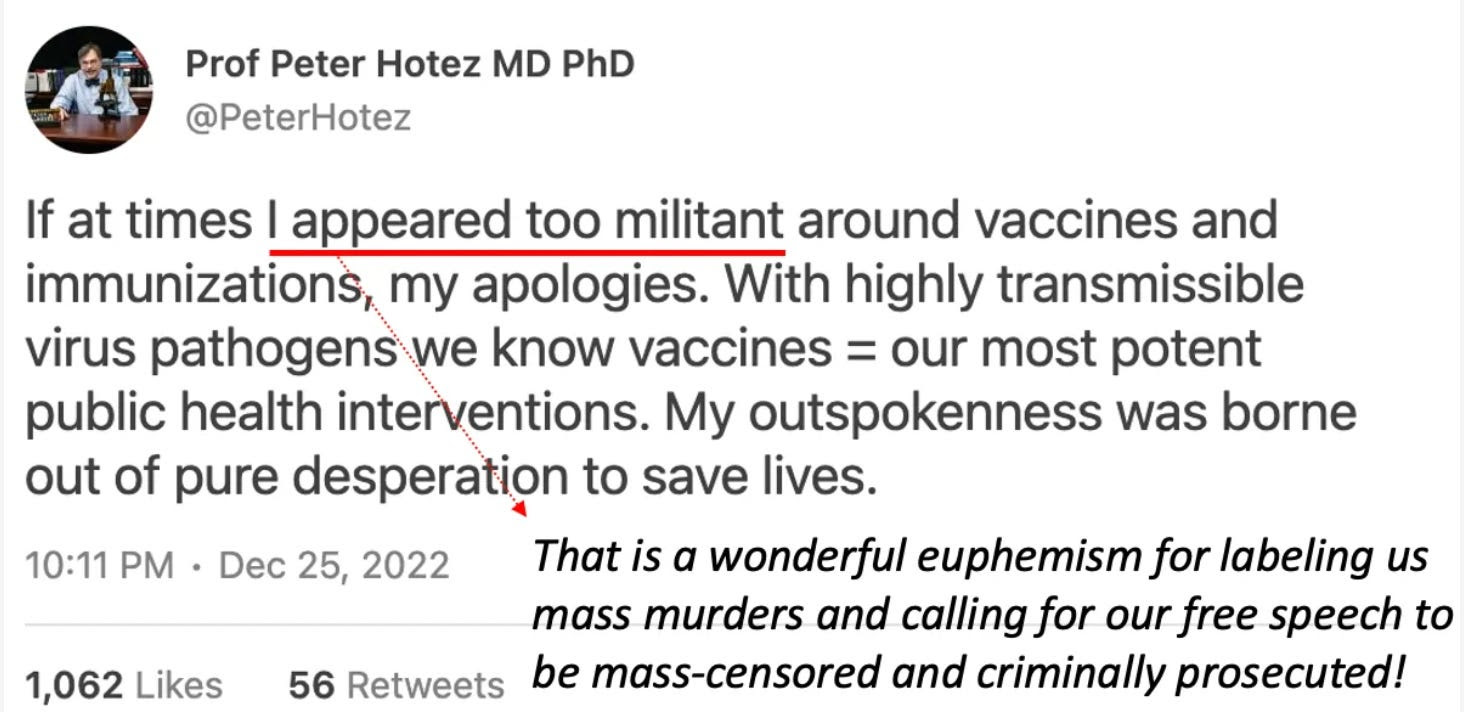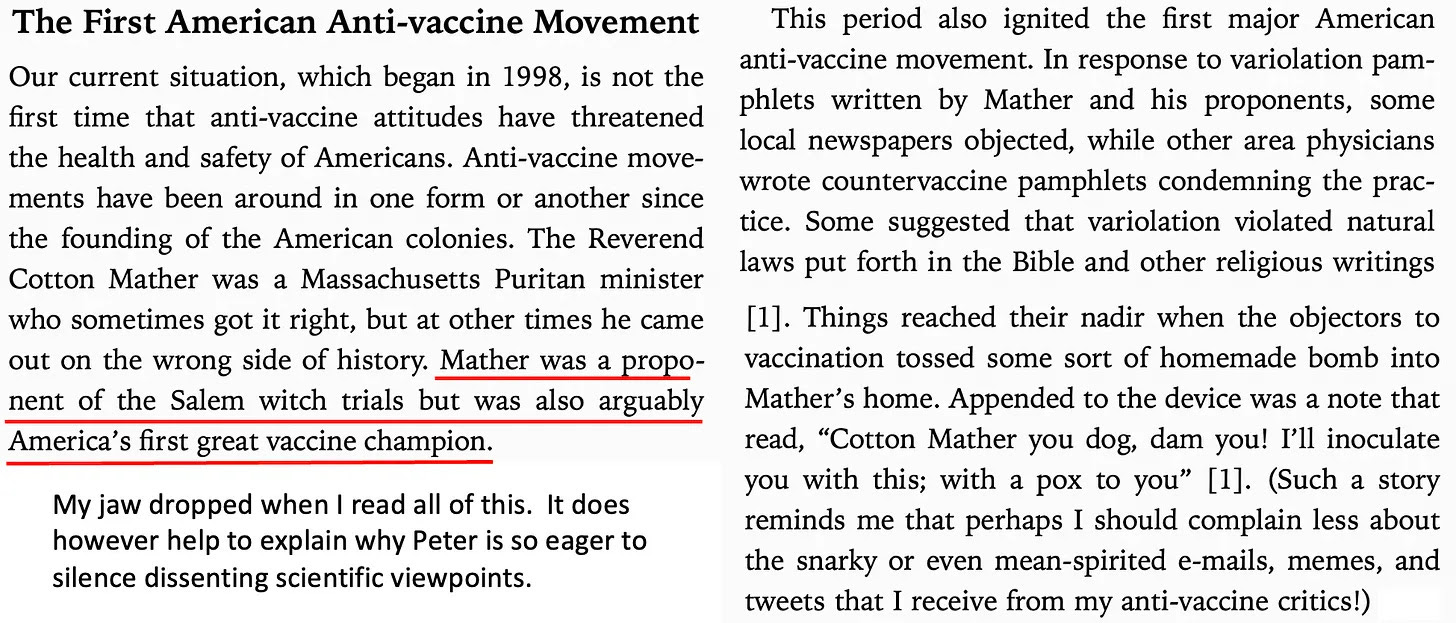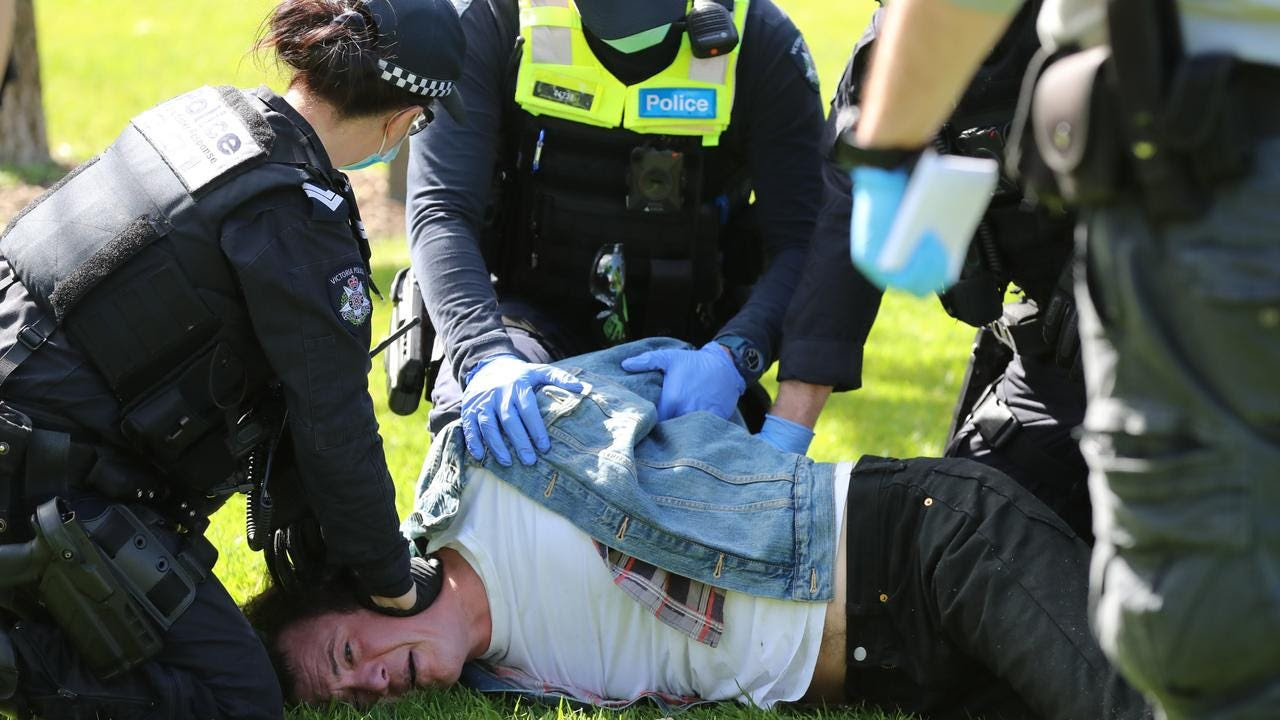Image from Ferrovial press release, “Baylor College of Medicine Receives $162,000 Donation from Ferrovial and Webber Amid COVID-19 Crisis”
This article was written by a physician who writes using the pseudonym “A Midwestern Doctor”. Both Dr. Pierre Kory and I are fans of this work and insights, I subscribe to his substack, and you may also wish to consider subscribing to his substack (“The Forgotten Side of Medicine”), which can be found here. He requested it be published in this substack (“Who is Robert Malone”) because the general topic is aligned with prior essays which we have published regarding cyberstalking, disruptors, chaos agents, fifth generation warfare, and propaganda.
When I was in High School, I heard a quote that really stuck with me:
“Great people talk about ideas, average people talk about themselves, and small people talk about others” — John C. Maxwell.
As I went on through life, I noticed that all of my happy and successful friends freely admitted when they made mistakes and rarely disparaged others. On the other hand, my friends whose lives were perpetually a mess, tended to do the opposite and in some cases, I had dear friends who made these mistakes for decades. Yet, regardless of how bad things went for them or how close we were, rarely would they be open to receiving feedback that required them to take ownership of their situation instead of blaming others for their bad luck.
Since I often observed this phenomenon inside and outside my circle of friends, I frequently asked myself what drove people to do this. Eventually, I concluded that much of it results from a classic way humans cope with pain.
A central dogma within Chinese Medicine is that there will be pain wherever something cannot flow in a human being (e.g., a fluid or their conception of the human biological energy known as “Qi”). The phrase classically used to convey this is “Tong Ze Bu Tong. Tong Ze Bu Tong” which translates to “when open, there is no pain. When there is pain, it is not open.”
In a recent article, I put forward the thesis that the secret to emotional health is to allow your emotions to be open and able to flow (and eventually exit you) rather than being contracted and suppressed (so they remain as a pathologic force within you indefinitely). Unfortunately, this is rarely practiced as our culture actively encourages us to do the opposite because it is much easier to endlessly sell unneeded products to emotionally unhealthy people.
Note: contractions can be acute or chronic. For example, clenching your fist creates an acute contraction, while people often have muscles in their body that have chronically remained tight for such a long time that they’ve become numb. Likewise, contractions also exist in the mind and spirit (e.g., consider how often people close their minds to things that don’t sit well with them). Initially, this concept seems abstract, but once you spot it a few times, it becomes very apparent how frequently habitual contractions crop up.
Whenever a problematic contraction (e.g., a painful one) is present in the body, mind, or spirit, to resolve it, the contraction needs to open up so it can disperse. However, the innate reflex instead is typically to contract into the contraction (e.g., the classic example is someone biting down on a stick right before a painful procedure), which provides a brief alleviation of the pain before it inevitably returns.
The (unhealthy) approaches people typically use to address physical and emotional pain thus somehow contract them into their pain or disconnect them from it. Unfortunately, the greater the pain or trauma someone carries, the harder it is for the individual to not contract into their pain (which is quite tragic as it perpetually prevents them from utilizing an approach that opens their system and can resolve the underlying trauma residing within them).
Generally speaking, I find that the more one can keep their body, mind, and spirit open rather than closing it down (especially under challenging circumstances), the more successful one will be in life. Unfortunately, this becomes increasingly difficult to do as individuals carries more and more trauma or enter more and more stressful circumstances.
Note: This resistance to contraction was a common factor amongst the doctors who did the right thing throughout the pandemic and resisted following the overpowering COVID-19 narrative.
So, while they are quite challenging to deal with, I often have a great deal of compassion for individuals who continually lash out at others if I can tell they hold significant pain somewhere in their body, mind, or spirit. In turn, I’ve lost count of how many times I’ve seen someone demonize someone else (without a good reason for doing so) as a way of contracting into their pain. I’ve even had a few cases where the individual directly admitted they were doing it to alleviate their pain temporarily and that they greatly feared a time would come when it was longer possible for them to continue lashing out at a relative who allowed them to.
In personal relationships, the best rule I’ve found to navigate this dynamic came from the book How to Be An Adult, which advised having both “Unconditional Love” and “Conditional Involvement” (meaning you can love the individual but separate yourself from them if they insist on making the relationship unhealthy). In the professional sphere, it gets a bit more challenging and complex (since you often have to be involved with those individuals), so I hesitate to try to soundbite a specific strategy.
However, I must note that in addition to alternative activist movements being comprised of the 5-10% of the population that see things for what they are (and thus dissent from the prevailing narrative), they also tend to attract individuals with habitual emotional contractions. I believe those individuals are drawn in because their self-sabotaging behaviors prevent them from succeeding within the conventional sphere resulting in the alternatives spheres being the only ones still available to them.
Thus, many within this movement have shared the observation that there are quite a few individuals within our movement who continually attack or demonize other people who I know are sincerely trying to do a good job. In almost all cases, just like my friends from childhood, I have found these people are unwilling to listen to feedback suggesting they behave differently, even when it could allow them to be much more successful in their endeavors.
Each time I go through this dynamic with someone (e.g., authors I knew from early on here) I am continually reminded of two song lyrics. One of them is from Taylor Swift:
And the haters gonna hate, hate, hate, hate, hate
Baby, I’m just gonna shake, shake, shake, shake, shake
I shake it off, I shake it off
The other is from an obscure German song about how we are continually lied to and given a false conception of reality by the ruling class:
You let it go
As if you know you are alone.You always underrate the ability
To change the state
Of mindAnd what you’ll find
Is hate so blind
It destroys every way out of here.
Note: the song is a bit weird and jarring, but it holds a special place in my heart because of how accurately it describes how we have been trained to close our hearts and minds to what is directly in front of us.
Attacking Public Figures
Because of my views on emotional contractions, I hesitate to publicly attack anyone I harbor negative feelings towards. Beyond not wanting to set a bad example, there are two specific reasons I do not do this:
•The first is that it is challenging to know with certainty what someone’s motivations are and if they are guilty of what they are accused of. I feel very strongly about upholding the doctrine of “innocent until proven guilty,” Thus, I will not make an accusation unless I am relatively sure of it.
To use a contemporary example, many friends and readers have shared concerns about Dr. Malone, and I’ve looked into quite a few of them. At this point, I’ve lost count of how many were either (often nonsensical) misinterpretations of existing information or assumptions from afar about his personality that are entirely at odds with who I have found Malone to be when speaking to him directly. In many of those instances, I can see why their thought processes and emotionally biased filters of reality led them to those negative conclusions. Simultaneously, I believe those misinterpretations could have been prevented had they prioritized being “beyond a reasonable doubt” before making their accusations.
•The second is that it is seldom productive to respond to an emotional contraction with an emotional contraction (the only time this can work is when one has the strength to overpower someone else, and irrespective of what people believe, it is very rare they actually do). There are two specific reasons why doing so is counterproductive:
•If you engage an emotional contraction while contracting inside yourself, all that does is cause the other person to contract more (this is somewhat analogous to saying something which makes the other person become defensive which grinds the discussion to a halt); you can only overcome a contraction by remaining open.
•Humans (and some animals) have an animalistic instinct to interpret someone contracting (e.g., reacting to taunt) as a sign of weakness, which causes them not to take the contracting individual seriously and often to be drawn to attack them (predators instinctually seek out the weakest prey).
All of this thus begs the question—when should you denounce public figures? My view is that some, and ideally all, of the following requirements first need to be met:
•The individual is directly responsible for something that has caused significant harm.
•The individual consciously chose to make the events happen and willfully ignored warnings not to engage in their conduct.
•The individual in the present moment continues to perpetuate the harmful events.
To illustrate these points, there are many public figures I fully admit I dislike (e.g., the militant doctors who have spent years going after anyone who questions an existing narrative). However, unless these people directly challenge something I put forward, I don’t confront them—and when that happens, I try to present their argument in the best possible light before debating it rather than doing the opposite and misportraying it (which is what ideologically driven individuals typically do).
Because of this, there are a relatively small number of people I directly criticize. For example, Anthony Fauci has met the above criteria, and as I discussed in a recent article, Robert Califf, the current head of the FDA, has as well.
Peter Hotez
Peter Hotez has spent his career as one of the vaccine establishment’s leading cheerleaders, and I believe he was one of the individuals most directly responsible for the deadly censorship we saw throughout COVID-19. This is because right before COVID-19, he paved the way for it by going on a media tour to make people aware of the extreme dangers of the anti-vaccine movement and the critical need to censor them on each platform.
Note: I have long suspected (but cannot prove) his actions were part of a public relations campaign because many other things also happened at that time, Hotez used the same phrases in each media appearance (suggesting a PR company made them), and he consistently is invited to speak by major networks despite not being photogenic (the guy is a mess).
After Hotez got the mass censorship he clamored for, he then pivoted to aggressively defending the current narrative on television, frequently asserting statements with absolute certainty that were later definitively proven to be false. Following this, he then pivoted to gradually denouncing with increasing fervor anyone who questioned the narrative (i.e., Hotez’s lies), which gradually escalated to him calling for any criticism of Anthony Fauci to become a federal hate crime and for governments around the world to mobilize against anyone who did not support COVID-19 vaccines because vaccine skeptics were killing people.
Since Hotez was a clown, most of us just ignored him. However, last December, this was posted by the WHO, and we decided Hotez’s actions had reached the point we needed to do something.
“Anti-vaccine activism, which I actually call anti-science aggression, has now become a major killing force globally."
– @PeterHotez, Professor and Dean @BCM_TropMed, on the devastating impact of #misinformation and disinformation. pic.twitter.com/ZluiMGJ2gX— World Health Organization (WHO) (@WHO) December 14, 2022
Note: many of Hotez’s statements in the WHO’s video were disingenuous or outright false (which in turn casts the WHO in a very bad light). Additionally, there is no way Hotez could have made this video himself, once again suggesting that this was part of a broader PR campaign.
After I saw Hotez’s call for political crackdowns, I remembered that during his 2019 media tour, Hotez had given an interview on Joe Rogan, which ended up being comical since Hotez was a mess, and unlike the rest of the media, Rogan gave Hotez a few tough questions. I felt simply letting Hotez show exactly who he was constituted the best response to his calls for political crackdowns, so I clipped their exchange and sent it to Pierre Kory. Many others felt the same way, and it immediately went viral (presently, it has 3.5 million views).
Note: in this clip and within the full interview, Hotez makes false statements, some of which his past statement demonstrated he knew were lies.
This might be my all time favorite Joe Rogan moment.
In just a few minutes, Peter Hotez inadvertently shows the world exactly what has gone wrong with our medical system and why his endless push for more vaccines will never create health. pic.twitter.com/Zye715BL0y
— Pierre Kory, MD MPA (@PierreKory) December 25, 2022
Later that day, once the clip had gone viral on Twitter, Hotez decided he needed to issue one of the few “apologies” of his career:
I then dug into Hotez’s background and learned a few noteworthy things about him:
•Because he ardently promotes vaccines and has an autistic daughter, anyone suggesting vaccines cause autism provokes profound mental and emotional contractions within him. He thus wrote a book to prove “Vaccines Did Not Cause Rachel’s Autism” and regularly cites it as proof vaccines don’t cause autism. I read the book and discovered not only did Hotez fail to provide any proof vaccines don’t cause autism, but he also provided a chronology of events and symptoms in his daughter identical to what many parents with autistic children have observed immediately following vaccination. That’s pretty sad but emblematic of how people like Hotez think.
•The most unbelievable passage I found in Peter Hotez’s book says a great deal about he sees himself and the world:
•Not surprisingly, I discovered that Peter Hotez has deep financial entanglements with the Gates Foundation and has received numerous large grants for vaccine development.
•Hotez is very thin-skinned. Anytime he is criticized, he frequently blames it on “antisemitism” or “anti-scientism,” he continually complains on Twitter about all the harassment he receives (which I feel is minimal relative to the inflammatory rhetoric he puts out) and he immediately blocks anyone who uses data to debunk one of his lies on Twitter.
Note: This personal weakness is something I associate with someone who follows a path they are internally conflicted with, which leads to a wide variety of contractions in the body, mind, and spirit, thereby preventing one from having the openness that could provide the internal strength to persist in the face of obstacles.
•Hotez worked very hard to brand himself as a scientific celebrity (to the point he even wrote a paper about how he’d done it) so he could be an ambassador of science. One of the most noteworthy things about the publication was Hotez emphasizing the importance of self-awareness with how you presented yourself in the public sphere—which again illustrates how distorted his view of the world is as how he presents himself publicly is often abysmal.
•In 2019, Hotez stated that the anti-vaccine lobby owns the internet and that the brave defenders of science need someone to protect the anti-vaxxer’s onslaught (see the clip for yourself).
The story of Peter Hotez is covered in more detail here:
The Forgotten Side of Medicine
Why Does Peter Hotez Think We Are Mass Murderers?
One of the most common tactics the medical industry uses to defend against the scrutiny of bad medical practices is to accuse those who question those practices (and thus make the public reluctant to receive them) of “killing their patients!” (under the logic that the treatment is so safe and effective that causing the public to avoid it equates to murd…
Read more
6 months ago · 966 likes · 1,114 comments · A Midwestern Doctor
When I looked at Hotez’s whole life story, I genuinely felt bad for the guy and could only imagine what his childhood was like. Beyond being a mess, he struck me as someone who continually got scammed by life and might just be being controlled by his unresolved internal distress to the point he could genuinely buy into the narrative that there was an evil cabal of anti-vaccine advocates who were terrorizing Hotez and his colleagues with impunity.
However, after I posted the article, an MD (who had been in Hotez and Fauci’s world and then left it to become a whistleblower) reached out and shared that she had directly worked with Hotez and deemed him to be a sociopath.
Anti-Science Violence
Recently Tucker Carlson aired the second episode of his widely viewed show on Twitter. A key point he made was how problematic nebulously defined crimes are as they undermine the fundamental rule of law our society depends upon (where you know what is illegal and what crime you are being charged with) and thereby leave everyone in a perpetual state of terror because they might accidentally break that unwritten rule.
These “crimes” are commonly created by the media relentlessly promoting an emotional charge to a word. Eventually, through doing this, anything associated with the word becomes “bad” solely based on the alleged association, which, in turn, becomes the means through which political opponents can be targeted as needed. This becomes particularly problematic because once that emotional gestalt is associated with the trigger word, the public’s filters become primed to associate everything with the evils of that trigger word (regardless of if it is or is not related) and then zealously move to enforce its de-facto law upon the entire population.
Peter Hotez’s key talking point has been to link everything he disagrees with (e.g., anything that questioned the scientifically flawed pandemic narrative) to being “anti-science” and to link “anti-science” to every other bad thing in the world (e.g., the far right). For the last few months, his focus has been promoting his upcoming book The Deadly Rise of Anti-science: A Scientist’s Warning, which in its brief Amazon description, concisely portrays Hotez’s distorted view of reality:
During the height of the COVID-19 pandemic, one renowned scientist, in his famous bowtie, appeared daily on major news networks such as MSNBC, NPR, the BBC, and others. Dr. Peter J. Hotez often went without sleep, working around the clock to develop a nonprofit COVID-19 vaccine and to keep the public informed. During that time, he was one of the most trusted voices on the pandemic and was even nominated for a Nobel Peace Prize for his selfless work. He also became one of the main targets of anti-science rhetoric that gained traction through conservative news media.
In this eyewitness story of how the anti-vaccine movement grew into a dangerous and prominent anti-science element in American politics, Hotez describes the devastating impacts it has had on Americans’ health and lives. As a scientist who has endured antagonism from anti-vaxxers and been at the forefront of both essential scientific discovery and advocacy, Hotez is uniquely qualified to tell this story. By weaving his personal experiences together with information on how the anti-vaccine movement became a tool of far-right political figures around the world, Hotez opens readers’ eyes to the dangers of anti-science. He explains how anti-science became a major societal and lethal force: in the first years of the pandemic, more than 200,000 unvaccinated Americans needlessly died despite the widespread availability of COVID-19 vaccines. Even as he paints a picture of the world under a shadow of aggressive ignorance, Hotez demonstrates his innate optimism, offering solutions for how to combat science denial and save lives in the process.
All of this thus raises a simple question. What exactly is “anti-science?”
I’ve spent a while looking for an answer to this, and as best as I can tell (I admit I have not read all of his papers or seen all his interviews), Hotez never defines it. Rather, as is seen in many other PR campaign who just repeats the word in a charged manner over and over with as many negative associations as possible to demonize anyone who disagrees with him. So, if anyone can cite an example of Hotez defining exactly what anti-science is, I would greatly appreciate seeing it.
At this point, the only definition I’ve found of anti-science comes from Wikipedia. It essentially says that individuals who are skeptical either of mainstream scientific positions or the scientific method being the objective arbiter of truth are “anti-science,” as are those who believe in concepts (e.g., alternative medicine) not supported by mainstream scientific consensus.
Unlike Hotez’s hysterical portrayal of “anti-science” extremists, the existing definition is fairly tame as it’s essentially just a philosophical disagreement and applies to almost every revolutionary scientist throughout history. In turn, I would argue the Wikipedia definition of “anti-science” refers to opposing the political institution of science rather than science itself (which to some extent is acknowledged within Wikepedia’s article). This essentially means anyone who rallies against “anti-science” (to protect the prevailing institutions of science) is attacking science itself, and that is exactly what we saw throughout COVID-19 as every piece of scientific evidence which could have prevented the catastrophe we witnessed was systematically attacked and censored.
Regardless of which interpretation you choose from the Wikipedia article, one thing is clear. The accepted definitions are a far cry from Hotez’s portrayal and likely why he refuses to define anti-science. After all if it was, it could no longer be weaponized against those dissenting from the current narrative:
It is my sincere hope that this article will inspire Hotez to define exactly what anti-science violence is or where it has occurred. I would also like to know exactly where this anti-science violence is occurring because presently, while acts of violence were committed throughout COVID-19, I only know of them being committed against those who did not support “the science.”
Conclusion
Many spiritual traditions heavily emphasize compassion because they believe it is the one emotion that can antidote all of the contractions inside you and those within the world around you. However, there is also much more to compassion than the colloquial understanding that it is equivalent to empathy.
For example, compassion requires you not only to bear witness to someone’s conduct while having a deep understanding of where it originated from but also to be able to do that without having any contractions within your heart. This is quite difficult to do, and I frequently see individuals claiming to be compassionate towards someone while simultaneously having all manner of negative emotions arise within them during their moments of compassion.
Likewise, genuine compassion also requires the wisdom to know what is right and the strength to do it. In my own life, I’ve had so many times where I did what I believed was in someone’s best interest that later ended up backfiring and doing the opposite of what I intended (e.g., I sought to “help” them, but all I accomplished was enabling a bad habit on their part which was eventually catastrophic for them).
In a recent post, Robert Malone also provided an important example of why compassion requires strength—as stated above, bad actors will often filter into activist groups and then, once established in the group, fracture it apart. These individuals are usually relatively easy to spot, but despite that, the group’s leadership often takes a passive role and allows the bad actors to entangle themselves within the group.
Malone argued that this arises from personal weakness in the leadership:
Protest movement leaders, eager to grow their organization and activities, are prone to say “Yes” to any and all volunteers. And very reluctant to prune out the bad wood, to get rid of the bad apples before they contaminate the entire barrel. And so they postpone, rationalize, provide soft reprimands. “C’mon kids, cut it out, just play nice with each other”.
And therein lies the trap. The nice-guy trap. The “I just want to be liked, can’t we all get along” trap.
Having seen the same, I agree but would go further and state that weakness arises from the emotions and minds of the leaders being closed down. Conversely, when open, and those individuals live in accordance with their values, they are filled with a strength that does not permit this cowardice and allows them to persist through the most challenging of obstacles—something many have observed throughout history (e.g., for those who stand against a malignant mass formation) and which I repeatedly saw in the 5-10% of my profession who resisted the COVID-19 narrative. Much of this is encapsulated by the iconic quote:
“If you don’t stand for something, you fall for anything.”
Like many of you, since I was a child, I always wanted to be a “good” person, but as life moved forward, more and more, I learned that this was easier said than done. Many of the ideas here likely come across as quite abstract, and I thank you for considering them. It is my sincere hope they provided insights on how each of us can be better prepared to stand against the wave of technocratic tyranny sweeping the world and provided more of a context for the abhorrent actions of those of like Peter Hotez.











